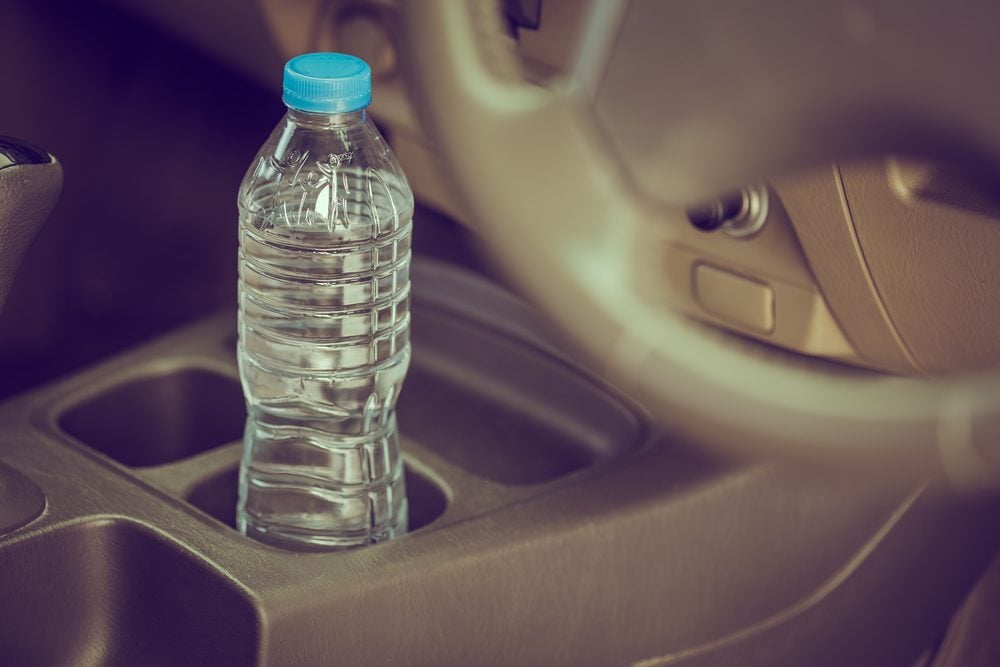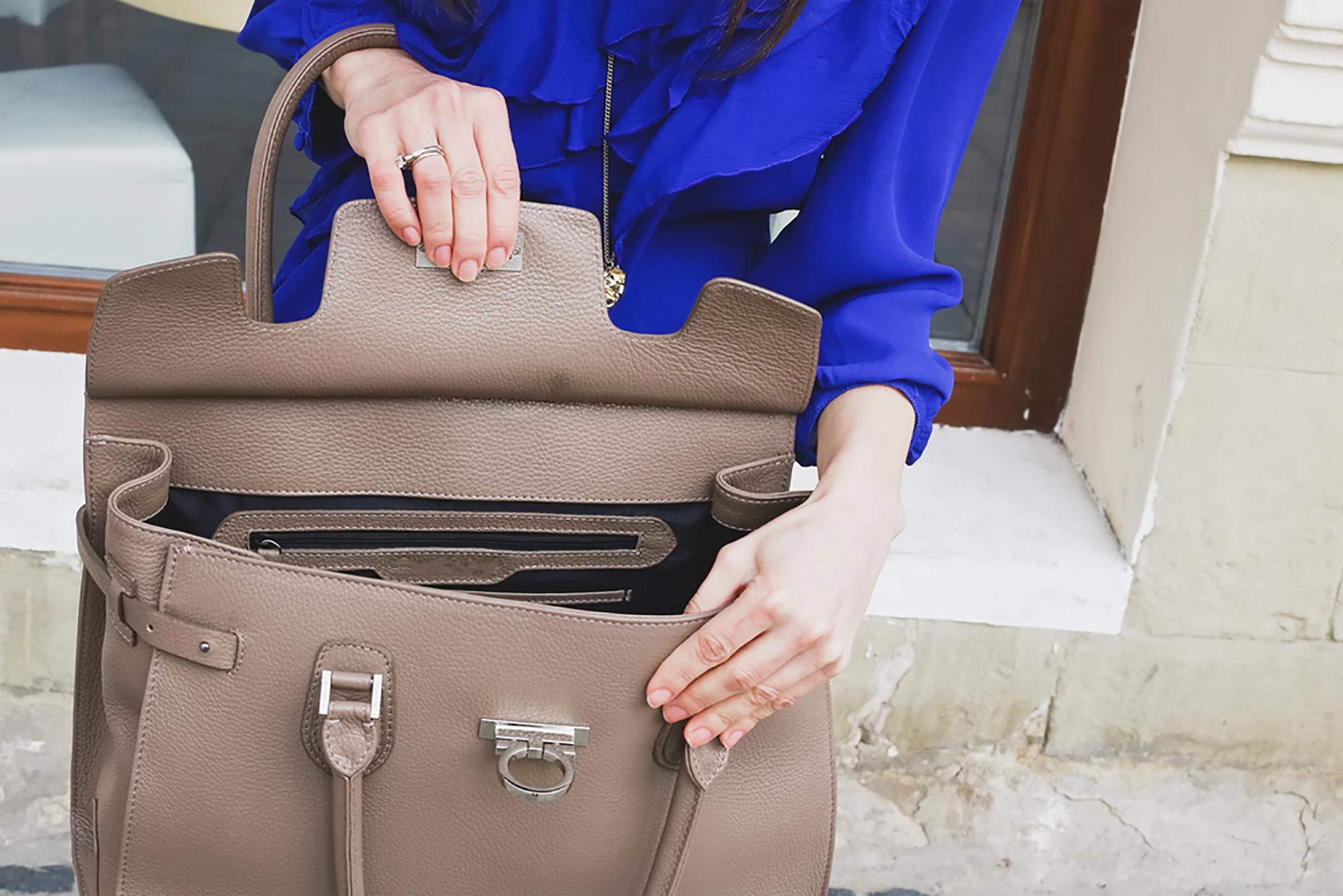
Medication
Most medicine should be left at room temperature, and your car will rarely stay at this moderate, indoor temp unless you’re driving with the air conditioning on. And once it’s parked? Forget about it. Heat probably won’t make your drugs directly harmful, but it could make them less effective.

Electronics
Gadgets like laptops, cell phones and thumb drives contain information that could be easy to steal if left in your car. Plus, they’re expensive to replace! It’s also hot in your car, and that’s not good for electronics, either.
If you have to leave your laptop or phone unattended in your vehicle (which you shouldn’t do), make sure the information contained in your electronics is encrypted. “It’s a strong layer of protection, and would need someone putting a fair amount of effort into it to view,” Velasquez says. “It’s much stronger than password protection.”

Sunscreen
Ironically, the active ingredients in sunscreen break down in high heat. Leaving a tube or bottle of sunscreen in the car on a hot day reduces its effectiveness, leading you to believe you’re protected when you’re not. Sun exposure can lead to burns and skin cancer, so it’s important to store sunscreen properly (you should even cover it with a towel when you’re at the beach or pool).
At the very least, your sunscreen could explode in your car—leaving you with a hot mess in every sense of the word. You might not shorten the life of your car, but you certainly will ruin the upholstery.

Water bottles
Studies have linked BPA and phthalates, chemicals found in plastic water bottles, with health conditions like cancer and heart disease. Letting a bottle heat up in the sun could cause these chemicals, as well as microplastics, to leach into the water.
And if the bottle has been opened and partially consumed, you could get bacterial growth if the bottle has been stored in your car. So pay attention to the expiration date on that bottle of water, and don’t leave it in the car if you want it to be fresh, clean and critter free.

Handbag
Leaving a purse or wallet in plain sight makes your car a target for thieves, even if you’ve locked your doors or taken the valuables out of your bag. “It doesn’t matter if the alarm goes off,” Velasquez says. “It’s attractive, and they’re going to grab it.” Keeping valuables out of sight is one of the easiest ways to deter opportunistic thieves and prevent car theft.

Glasses
Take advantage of your car’s sunglasses compartment while driving, but don’t leave your shades in it after you reach your destination. Heat can warp plastic frames and make metal ones too hot to wear. Your lenses could warp, too, making it difficult to see (and leaving you with an expensive repair). Leaving your glasses or sunglasses on the dashboard is even worse, because the windshield could attract sunlight like a magnifying glass.

Important documents
If you have personal documents to shred or mail, make it a priority on your to-do list. Letting files like school transcripts or tax forms sit in your car while you run other errands leaves information vulnerable if anyone breaks into your vehicle, Velasquez says. “Put it in the car, take care of it and then you’re done,” she says. “You have to follow through.”
Bottom line: If they don’t need to be in your car right now, leave documents at home or in the office.

Passport
Never leave a passport in the car while traveling, even if it seems like it’s too bulky to carry around. Identity theft is even easier with a passport than with a driver’s license, Velasquez says. “We have to think of data and pieces of our identity as valuables,” she continues. “You’re not going to leave jewelry in the car, but we don’t have that same level of concern with things that make up our identity, and we need to.”

Wine
Wait until after work or other errands to pick up a bottle of wine. If the bottle gets too hot, air inside the bottle could expand and put pressure on the cork. (This goes for storing wine on the fridge, too.) If the cork loosens or pushes out, even a little, it can introduce bacteria and contaminate the wine. That means no wine with dinner, though you could end up with vinegar.

Young children
Even if you don’t expect an errand to take more than a few minutes, leaving children alone in the car on a hot day puts their safety at risk. In 2024, 39 children died from heatstroke after being left in a car, which is two more than the national average.
Even with the window cracked, temperatures inside cars can spike almost 20 degrees in just 10 minutes, according to the Centers for Disease Control and Prevention. Check your state laws—in some areas, it’s illegal to leave young children alone, even if it isn’t sweltering outside.

Pets
Hundreds of pets die every year from overheating in vehicles, according to the American Veterinary Medical Association. After an hour, car temperatures can reach 45 degrees higher than the climate outside, and even a shaded parking spot won’t keep the temperatures much cooler. Many people think cracking a window or parking in the shade is enough when traveling with pets, but it puts pets at serious risk.

Groceries
Save your grocery run for the end of your errands list. In general, perishable food should be refrigerated within two hours. In the summer, you have an even shorter window. If it’s more than 90 degrees outside, food shouldn’t be left out for more than an hour, according to the U.S. Department of Agriculture. And once you’re home, make sure to store your groceries properly. Some foods don’t belong in the fridge, even if that’s your first instinct.

Indoor plants
Consider the weather before heading to a gardening center, especially if you’re not heading home straight after. That goes for hot weather and cool. Even relatively mild temperatures of 45 to 50 degrees can kill some plants within an hour, and if the leaves are touching the windows, the chilly glass could ruin the foliage. Hot temperatures can also be deadly to plants, so keep them shaded and cool on your drive home, and bring them indoors as soon as possible.

Aerosol cans
Ever read the fine print on an aerosol can? It usually says something to the effect of: Don’t store in temperatures above 120 degrees. That’s because heat causes the pressure inside aerosol cans to rise. In rare cases, the heat in a car can get so intense that the aerosol can explodes, especially if you leave it in direct sunlight.
A couple in Louisiana found this out the hard way in 2024, when a spray can became a projectile inside their vehicle, shattering their windshield. Luckily, no one was injured, but things could have been much worse.

Lipstick
Your favorite tube won’t stand a chance in the sky-high summer temperatures. Keep lipstick from turning into an unusable, melted mess by toting it in and out, rather than leaving it in the car for touch-ups in front of the sun visor mirror.
About the expert
|
Why trust us
At Reader’s Digest, we’re committed to producing high-quality content by writers with expertise and experience in their field in consultation with relevant, qualified experts. We rely on reputable primary sources, including government and professional organizations and academic institutions as well as our writers’ personal experiences where appropriate. We verify all facts and data, back them with credible sourcing and revisit them over time to ensure they remain accurate and up to date. Read more about our team, our contributors and our editorial policies.
Sources:
- Eva Velasquez, CEO of the Identity Theft Resource Center
- Mississippi Eye Care: “The Consequences of Leaving Your Glasses in a Hot Car”
- Kids and Car Safety: “State Laws and Federal Regulations”
- National Safety Council: “Hot Car Deaths”
- American Veterinary Medical Association: “Pet safety in vehicles”
- American Society for the Prevention of Cruelty to Animals: “Dogs in Hot Cars and Other Summer Dangers”
- Lowe’s: “Protect and Transport Plants”
- CDC: “Infants and Children and Heat”
- 99.9 KTDY: “Louisiana Couple Has Aerosol Can Explode in Vehicle”
The post 15 Everyday Things You Shouldn’t Leave in Your Car appeared first on Reader's Digest.
from Reader's Digest https://ift.tt/ctVEbdG
Comments
Post a Comment